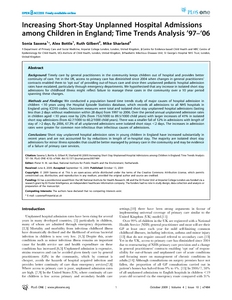Saxena, S; Bottle, A; Gilbert, R; Sharland, M
(2009)
Increasing Short-Stay Unplanned Hospital Admissions among Children in England; Time Trends Analysis '97-'06.
PLOS ONE, 4 (10).
e7484.
ISSN 1932-6203
https://doi.org/10.1371/journal.pone.0007484
SGUL Authors: Sharland, Michael Roy
![[img]](https://openaccess.sgul.ac.uk/445/1.hassmallThumbnailVersion/pone.0007484.pdf)  Preview |
|
["document_typename_application/pdf; charset=binary" not defined]
Published Version
Download (235kB)
| Preview
|
Abstract
BACKGROUND: Timely care by general practitioners in the community keeps children out of hospital and provides better continuity of care. Yet in the UK, access to primary care has diminished since 2004 when changes in general practitioners' contracts enabled them to 'opt out' of providing out-of-hours care and since then unplanned pediatric hospital admission rates have escalated, particularly through emergency departments. We hypothesised that any increase in isolated short stay admissions for childhood illness might reflect failure to manage these cases in the community over a 10 year period spanning these changes.
METHODS AND FINDINGS: We conducted a population based time trends study of major causes of hospital admission in children <10 years using the Hospital Episode Statistics database, which records all admissions to all NHS hospitals in England using ICD10 codes. Outcomes measures were total and isolated short stay unplanned hospital admissions (lasting less than 2 days without readmission within 28 days) from 1997 to 2006. Over the period annual unplanned admission rates in children aged <10 years rose by 22% (from 73.6/1000 to 89.5/1000 child years) with larger increases of 41% in isolated short stay admissions (from 42.7/1000 to 60.2/1000 child years). There was a smaller fall of 12% in admissions with length of stay of >2 days. By 2006, 67.3% of all unplanned admissions were isolated short stays <2 days. The increases in admission rates were greater for common non-infectious than infectious causes of admissions.
CONCLUSIONS: Short stay unplanned hospital admission rates in young children in England have increased substantially in recent years and are not accounted for by reductions in length of in-hospital stay. The majority are isolated short stay admissions for minor illness episodes that could be better managed by primary care in the community and may be evidence of a failure of primary care services.
| Item Type: |
Article
|
| Additional Information: |
PubMed ID: 19829695
©2009 Saxena et al. This is an open-access article distributed under the terms of the Creative Commons Attribution License, which permits unrestricted use, distribution, and reproduction in any medium, provided the original author and source are credited. |
| Keywords: |
Child, Child, Preschool, Emergency Service, Hospital, England, Female, Hospitalization, Hospitals, Humans, Infant, Insurance Claim Reporting, Length of Stay, Male, Models, Statistical, Patient Admission, Time Factors, Science & Technology, Multidisciplinary Sciences, Science & Technology - Other Topics, PRESCHOOL-CHILDREN, HEALTH-SERVICES, UNITED-STATES, ACUTELY ILL, CARE, CONTINUITY, PARENTS, CHILDHOOD, PROVIDER, QUALITY |
| SGUL Research Institute / Research Centre: |
Academic Structure > Infection and Immunity Research Institute (INII) |
| Journal or Publication Title: |
PLOS ONE |
| ISSN: |
1932-6203 |
| Related URLs: |
|
| Web of Science ID: |
WOS:000270847800017 |
| Dates: |
| Date |
Event |
| 2009-10-15 |
Published |
|
  |
Download EPMC Full text (PDF)
|
 |
Download EPMC Full text (HTML)
|
| URI: |
https://openaccess.sgul.ac.uk/id/eprint/445 |
| Publisher's version: |
https://doi.org/10.1371/journal.pone.0007484 |
Statistics
Item downloaded times since 30 Apr 2012.
Actions (login required)
 |
Edit Item |



